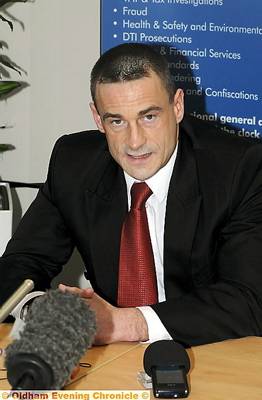Action plan to avoid another Millergate
Reporter: MARINA BERRY
Date published: 24 November 2010
OLDHAM Council is to set up an action plan to make sure there is no repetition of the failed fraud trial of kitchen trader Vance Miller which cost Oldham taxpayers £2.1 million.
Members of the audit committee last night set the wheels in motion for new rules to make potentially risky prosecutions the responsibility of a corporate decision.
They were acting on the recommendations of an independent review into the Vance Miller case which resulted in the sacking of Oldham Trading Standards head, Tony Allen, following January’s spectacular collapse of the court case.
The report’s author, ex-lawyer and former Birmingham City Council chief executive, Stewart Dobson, was at last night’s committee meeting to outline his findings and make recommendations to prevent a similar occurrence in the future.
Councillor Abdul Jabbar, chairing the committee, called for a detailed action plan in the wake of the report, and said: “We need to be satisfied a procedure based on the three recommendations in the report is drawn up and brought back to this committee.”
The move aims to put a system in place to flag up proposed prosecutions which need special attention because they are ambitious, likely to be expensive and time-consuming, or controversial.
They will then be scrutinised on a corporate basis, independently of the people who were responsible for the investigation.
Mr Dobson recommended that an estimate of potential costs be made before any so-called special prosecutions went ahead, and said those which represented a corporate risk to the council should go on the risk register and be carefully monitored.
Council chief executive Charlie Parker said systems had already changed, but admitted “a lot more” needed to be done. He called for a separate report on risk management, which he described as “an important building block for better governance, to get good practice embedded in the organisation”.
His suggestion was welcomed by audit committee member Councillor Mike Buckley, who said he had long thought the risk register was unsatisfactory, adding: “In its current form it is difficult to pick out what are the high-impact issues and what is trivia.”
There was some concern of the effect that savage budget cuts hitting the council would have on the manpower needed to put the plan into action.
Mr Parker said: “You always have to cut your cloth, but there are certain things you have to do, and this will be one.”
He said the decision to prosecute Mr Miller, which was taken before he was appointed as chief executive, was treated as a trading standards department issue rather than a corporate issue, which would have resulted in a different level of support, scrutiny and allocation of resources.
Mr Dobson said, however, the ultimate decision to prosecute might well have been the same even if the case had been handled better.
He said the council could not have reasonably foreseen that the trial would collapse after 17 weeks.
In fact, he said: “Initially the trial seemed to be progressing satisfactorily from the council’s point of view, and it was only after two months that serious and significant problems began to emerge.
“Any court proceedings must involve a degree of uncertainty, particularly those which have a contested Crown Court jury trial.”
Most Viewed News Stories
- 1You can score free tickets to a Latics game while supporting Dr Kershaw’s Hospice
- 2Primary school in Uppermill considers introducing new ‘faith-based’ entry criteria to tackle...
- 3Public inquiry announced into rail upgrade that could leave villages ‘cut off’ for months
- 4Tributes paid following death of hugely respected Oldham community figure Dale Harris
- 5Trio arrested, drugs and weapons seized following Chadderton raid





